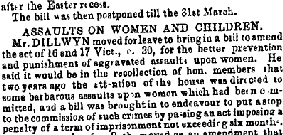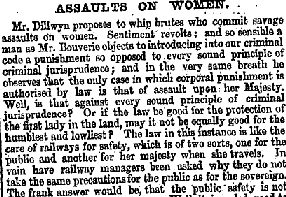Daily News, London, 13 March 1856
Imperial Parliament.
Assaults on Women and Children.
House of Commons. -- Wednesday, March 12.
The SPEAKER took the chair at twelve o'clock.
......................
 Mr. DILLWYN moved for leave to bring in a bill to amend the
act of 16 and 17 Vict., c. 30, for the better prevention and
punishment of aggravated assault upon women. He said it would be
in the recollection of hon. members that two years ago the
attention of the house was directed to some barbarous assaults
upon women which had been committed, and a bill was brought in to
endeavour to put a stop to the commission of such crimes by
passing an act imposing a penalty of a term of imprisonment not
exceeding six months. Mr. DILLWYN moved for leave to bring in a bill to amend the
act of 16 and 17 Vict., c. 30, for the better prevention and
punishment of aggravated assault upon women. He said it would be
in the recollection of hon. members that two years ago the
attention of the house was directed to some barbarous assaults
upon women which had been committed, and a bill was brought in to
endeavour to put a stop to the commission of such crimes by
passing an act imposing a penalty of a term of imprisonment not
exceeding six months.
 The then member for Bath moved as an amendment that corporal
punishment should be inflicted, but that amendment was lost by
101 to 50. The then member for Bath moved as an amendment that corporal
punishment should be inflicted, but that amendment was lost by
101 to 50.
From returns which had been made it appeared that in 1854
there were 353 convictions under the act, while in 1855 there
were 320; so that they had not much diminished.
He proposed to bring in a bill which should repeal the former
bill, and re-enact it, with the exception of the second clause.
He proposed to limit the term of imprisonment to two months, but
not to be less than 14 days; he also proposed that the person
convicted should be once privately whipped, and that the
punishment should be inflicted in all cases. The hon. gentleman
then read several cases which have recently been heard before the
magistrates. Lengthened imprisonment had failed to put down the
offence, and be believed that nothing would put it down except
the infliction of corporal punishment.
Mr. BARROW said he should not oppose the introduction of the
bill, but he thought they ought to have more experience of, and
more information as to, the working of the last act before they
applied corporal punishment.
Mr. BOUVERIE also should not object to the introduction of the
bill, but he hoped the house would pause before they passed a
bill re-introducing the whipping of adults in this country, which
was totally contrary to the spirit of our legislation for a long
series of years past. It was a punishment that could not be
measured; if inflicted lightly, it was scarcely any punishment at
all; and if inflicted heavily, it was torture. There was only one
offence for which in recent years they had imposed the penalty of
whipping, and that was for certain offences against her Majesty.
They had had but little experience of the present act, and he
trusted therefore that the hon. gentleman would not take it for
granted that this bill would pass so readily through its other
stages as the present.
Mr. W. WILLIAMS said they had almost every day in the
newspapers details of this class of offences that were not only a
disgrace to humanity, but a disgrace to this country. Large
amounts and small amounts of imprisonment had all failed. The
right honourable gentleman had referred to their having imposed
the penalty of corporal punishment for the offence of attempting
the life of her Majesty. That had completely stopped that
offence. The right honourable gentleman said flogging was
degrading, yet that was the punishment inflicted on our soldiers
and sailors, and when attempts had been made to substitute some
other punishment, they were always told that discipline could not
be maintained without it. He knew nothing so likely to stop the
committal of these offences as flogging the offenders.
Leave was then given to bring in the bill, and the House
adjourned at 25 minutes to 4.
News of the World, London, 23 March 1856
Editorial
Assaults on Women.
 Mr. Dillwyn proposes to whip brutes who commit savage assaults
on women. Sentiment revolts; and so sensible a man as Mr.
Bouverie objects to introducing into our criminal code a
punishment so opposed to every sound principle of criminal
jurisprudence; and in the very same breath he observes that the
only case in which corporal punishment is authorised by law is
that of assault upon her Majesty. Mr. Dillwyn proposes to whip brutes who commit savage assaults
on women. Sentiment revolts; and so sensible a man as Mr.
Bouverie objects to introducing into our criminal code a
punishment so opposed to every sound principle of criminal
jurisprudence; and in the very same breath he observes that the
only case in which corporal punishment is authorised by law is
that of assault upon her Majesty.
Well, is that against every sound principle of criminal
jurisprudence? Or if the law be good enough for the protection of
the first lady in the land, may it not be equally good for the
humblest and lowliest?
The law in this instance is like the care of railways for
safety, which is of two sorts, one for the public and another for
her majesty when she travels. In vain have railway managers been
asked why they do not take the same precautions for the public as
for the sovereign. The frank answer would be, that the public
safety is not worth the trouble and expense. Well, it is ruled
good to whip a ruffian who assaults the Queen, and bad to whip a
ruffian who kicks and cuffs a woman of lower estate.
And in the very same newspaper, in the parliamentary report of
which we are brought to this conclusion of discriminating
justice, we find an account of a trial of some big schoolboys for
an assault, in the course of which the judge manifested some
feelings by no means of the sentimental order.
A sickly boy at Tonbridge School, having been forbidden to
play at cricket by his father, was ordered to the cricket ground
to fag by his master. The boy pleaded the paternal prohibition.
He was laid hold of and severely caned, some of the lads holding
him while his tyrant belaboured him. That was not all; the
maltreatment and its consequences made him late for school, and
for this the master punished him as if it had been his own will
and pleasure to be drubbed into a state of incapacity.
What said Baron Alderson? -- "If these sort of actions
were encouraged, I am sure we might have 500 similar actions from
Eton alone in the course of the year (a laugh). It is a pity
he did not bear the beating as other boys generally do, and
without crying out. -- Mr. James said, of course, the more
he cried the more he got thrashed (a laugh).
Now we cannot see much difference between a supple cane and a
whip, and we are at a loss to understand why chastisement with
the one upon a lad old enough to bear her Majesty's commission is
a thing to be laughed at, while the proposal of a punishment
hardly of more severity upon a brute who has maltreated a woman
is regarded with such disgust.
Mark how the mind of ingenuous youth is formed both by
suffering and practising tyranny. The bully's willing assistants
hold the object of displeasure while his master lays on the cane;
and the judge on the bench, and a very able judge too, has no
remark to make but that the sufferer, a weakly lad, should have
borne the beating as other boys do, without crying or
complaining.
But oh, if you proposed to put the same law on that athletic
costermonger who has beaten his wife to jelly, how the sentiment
of the country would rush to the rescue. Yet what is the
essential difference? simply that between leather and wood.
The costermonger, it is true, is not a boy, neither is he a
man. He is a brute, only amenable to the discipline controlling
his savage mind. Let it be borne in mind that assaults on her
Majesty were frequent before the punishment of whipping was
awarded to the outrage, but since then there has not been one
repetition of the offence.
There are people who say with Lord Palmerston, that if
outrages upon women cannot be repressed by other means, they
will, however reluctantly, consent to corporal punishment. But
this is very bad reasoning. Corporal punishment is or is not
calculated to prevent the offence; if it be, it should be adopted
at once; if it be not, the failure of other means will not render
it more suitable and effective.
| 

![]()